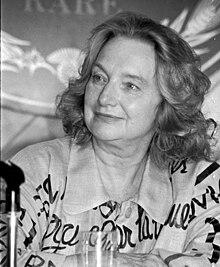Christine Arnothy

This article's tone or style may not reflect the encyclopedic tone used on Wikipedia. (October 2015) |
Christine Arnothy (20 November 1930 – 6 October 2015) was a Budapest-born French writer. She has written numerous books, including J'ai quinze ans et je ne veux pas mourir (1955) (I am Fifteen and I Do Not Want to Die). She married [when?] Claude Bellanger (1909–1978).[1]
J'ai quinze ans et je ne veux pas mourir is based on her diary, which recorded her experience as a teenager during the 1945 siege of Budapest. She fled Hungary with her parents. When she arrived in France, her diary was the only possession she still had. The book was reviewed in Harper's Magazine in 1956.[2] It received good reviews also from The Daily Express,[3] The New York Times,[4]Herald Tribune,[5] San Francisco Examiner,[6] Chicago Sunday Tribune[7] and The Times.[8]
She later published a sequel, It Is Not So Easy to Live, a second part which does not come from her journal but from her memory; she chronicles her escape via Vienna to Paris, where she eventually settled and married. She also wrote several detective stories under the pseudonym William Dickinson, among other books.[citation needed]
References
- ^ "Décès de la romancière Christine Arnothy". RTBF Info (in French).
- ^ Harpers Magazine review of J'ai quinze ans et je ne veux pas mourir, harpers.org; accessed 12 October 2015.
- ^ The Daily Express, 25 February 1956; "For this ugly story is made beautiful by Christine's love of life: her enjoyment of humanity. What a triumph to live through such horror and to make it a resounding success."
- ^ The New York Times, 10 June 1956; "This astonishing tale always rings true and it is not surprising that in the original French it won the Prix des Vérités. Christine Arnothy writes with compassion, economy and reticence."
- ^ Herald Tribune, 10 June 1956; "The juxtaposition of tender youth with war's brutality gives any book an irresistible poignance, and when the narrator has so marked a flair for writing as Christine Arnothy, the story can hardly fail to move."
- ^ San Francisco Examiner, 11 June 1956; "Seldom have horror and tenderness been more effectively juxtaposed."
- ^ Chicago Sunday Tribune, 8 July 1956; "The incidents recorded by Miss Arnothy set the book apart from other such records. As in the diary of Anne Frank, such a story becomes more tender, yet richer, because of the point of view. (…) It is a book believable and intense, with a "you are there" quality that makes the ultimate fleeing from the city and then from the country a great relief."
- ^ The Times, 15 March 1956; "If Miss Arnothy's account is credible, yet not intolerable, this is in part due to her instinctive skill as a writer, and in part to the sudden flashes of humanity which light up the terror."
